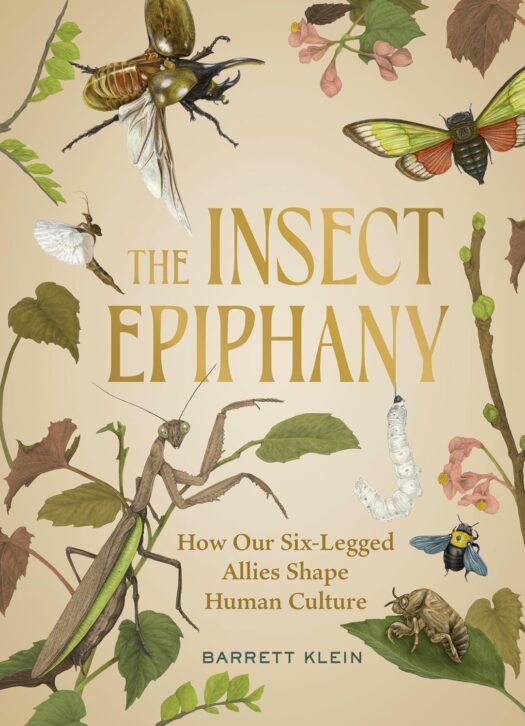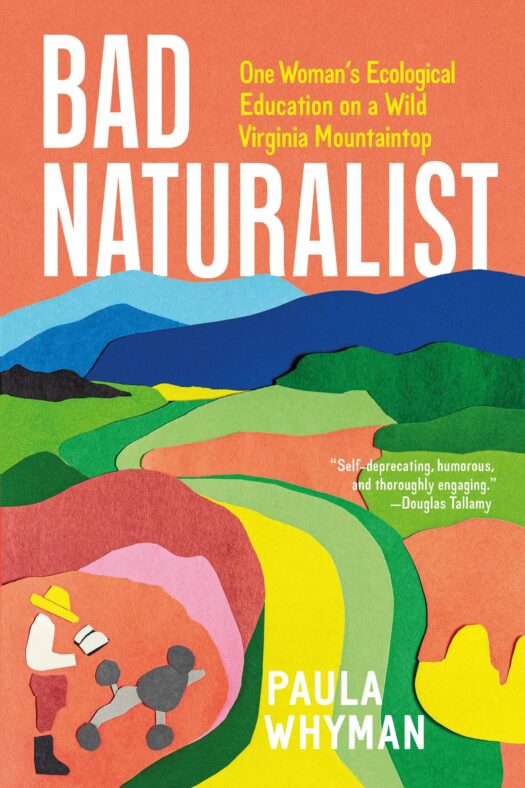انتقل إلى وضع عدم الاتصال باستخدام تطبيق Player FM !
How Insects Shape Our Culture & Stewarding Wildness
Manage episode 460469597 series 1191071
In this episode of Writer’s Voice, entomologist and author Barrett Klein discusses his book, The Insect Epiphany: How Our Six-Legged Allies Shape Human Culture. From the crucial roles insects play in ecosystems to their influence on art, architecture, and medicine, Klein unpacks the deep connections between humans and these often misunderstood creatures. [Image above by Barrett Klein.]
“We’d be knee-deep in dung and heaps of cadavers and corpses if it weren’t for insects.” — Barrett Klein
Then, Paula Whyman, author of Bad Naturalist: One Woman’s Ecological Education on a Wild Virginia Mountaintop, shares her journey from novice gardener to passionate steward of over 200 acres of meadow and forest. Whyman discusses the challenges of managing invasive species, restoring native habitats, and the unexpected joys of observing interconnected ecosystems.
“The kind of human interference that’s good is managing for the plants that will help the local ecosystem.” — Paula Whyman
Connect with WV:
Follow us on Bluesky @rheannonf.bsky.social and subscribe to our Substack. Or find us on Facebook at Writers Voice with Francesca Rheannon, and on Instagram and Threads @WritersVoicePodcast
Key Words: Barrett Klein, The Insect Epiphany, ecological importance of insects, insect pollination, biomimicry, insect-inspired architecture, insect conservation, pollinator decline, Paula Whyman, Bad Naturalist, native plants, invasive species management, rewilding, land stewardship.
Similar Episodes: Oliver Milman, THE INSECT CRISIS; Isabelle Tree, WILDING; Doug Tallamy, NATURE’S BEST HOPE

The Insect Epiphany: Barrett Klein on How Insects Shape Our World
In The Insect Epiphany, Barrett Klein takes us on a journey through the hidden world of insects. Klein explores their critical ecological functions—pollination, decomposition, and nutrient cycling—and their cultural significance, from silk production to architectural inspiration.
Highlighting ethical dilemmas, conservation challenges, and surprising stories, Klein emphasizes the need to reevaluate our relationship with the little creatures that “run the world.”
Key Topics:
- The ecological roles of insects: pollination, decomposition, and nutrient dispersal
- The insect apocalypse: implications of declining insect populations
- How insects have influenced art, architecture, and human innovation
- Ethical considerations in using insects, from sericulture to pollinator exploitation
- Conservation challenges: balancing agriculture and biodiversity
- Biomimicry and the lessons we can learn from insect behavior and structures

Bad Naturalist: Paula Whyman on Stewarding a Wild Virginia Mountaintop
Paula Whyman takes us on a transformative journey in her memoir Bad Naturalist: One Woman’s Ecological Education on a Wild Virginia Mountaintop.
Moving from suburban gardening failures to managing 200 acres of meadow and forest, Whyman shares lessons on rewilding, invasive species control, and the delicate balance of ecosystems. Inspired by Isabella Tree’s Wilding and Doug Tallamy’s Nature’s Best Hope, she discusses the importance of ecological stewardship and the profound insights gained through observation and patience.
Key Topics:
- Whyman’s initial inspiration: transitioning from a suburban gardener to a land steward
- Learning the difference between native plants and invasive species
- The challenges of managing invasive plants like mile-a-minute vine, autumn olive, and stiltgrass
- The ecological significance of native species like white oak trees and yellow crownbeard
- Restoring habitats for declining bird species like bluebirds and kestrels
- The concept of ecological entanglement and the interdependence of species
23 حلقات
Manage episode 460469597 series 1191071
In this episode of Writer’s Voice, entomologist and author Barrett Klein discusses his book, The Insect Epiphany: How Our Six-Legged Allies Shape Human Culture. From the crucial roles insects play in ecosystems to their influence on art, architecture, and medicine, Klein unpacks the deep connections between humans and these often misunderstood creatures. [Image above by Barrett Klein.]
“We’d be knee-deep in dung and heaps of cadavers and corpses if it weren’t for insects.” — Barrett Klein
Then, Paula Whyman, author of Bad Naturalist: One Woman’s Ecological Education on a Wild Virginia Mountaintop, shares her journey from novice gardener to passionate steward of over 200 acres of meadow and forest. Whyman discusses the challenges of managing invasive species, restoring native habitats, and the unexpected joys of observing interconnected ecosystems.
“The kind of human interference that’s good is managing for the plants that will help the local ecosystem.” — Paula Whyman
Connect with WV:
Follow us on Bluesky @rheannonf.bsky.social and subscribe to our Substack. Or find us on Facebook at Writers Voice with Francesca Rheannon, and on Instagram and Threads @WritersVoicePodcast
Key Words: Barrett Klein, The Insect Epiphany, ecological importance of insects, insect pollination, biomimicry, insect-inspired architecture, insect conservation, pollinator decline, Paula Whyman, Bad Naturalist, native plants, invasive species management, rewilding, land stewardship.
Similar Episodes: Oliver Milman, THE INSECT CRISIS; Isabelle Tree, WILDING; Doug Tallamy, NATURE’S BEST HOPE

The Insect Epiphany: Barrett Klein on How Insects Shape Our World
In The Insect Epiphany, Barrett Klein takes us on a journey through the hidden world of insects. Klein explores their critical ecological functions—pollination, decomposition, and nutrient cycling—and their cultural significance, from silk production to architectural inspiration.
Highlighting ethical dilemmas, conservation challenges, and surprising stories, Klein emphasizes the need to reevaluate our relationship with the little creatures that “run the world.”
Key Topics:
- The ecological roles of insects: pollination, decomposition, and nutrient dispersal
- The insect apocalypse: implications of declining insect populations
- How insects have influenced art, architecture, and human innovation
- Ethical considerations in using insects, from sericulture to pollinator exploitation
- Conservation challenges: balancing agriculture and biodiversity
- Biomimicry and the lessons we can learn from insect behavior and structures

Bad Naturalist: Paula Whyman on Stewarding a Wild Virginia Mountaintop
Paula Whyman takes us on a transformative journey in her memoir Bad Naturalist: One Woman’s Ecological Education on a Wild Virginia Mountaintop.
Moving from suburban gardening failures to managing 200 acres of meadow and forest, Whyman shares lessons on rewilding, invasive species control, and the delicate balance of ecosystems. Inspired by Isabella Tree’s Wilding and Doug Tallamy’s Nature’s Best Hope, she discusses the importance of ecological stewardship and the profound insights gained through observation and patience.
Key Topics:
- Whyman’s initial inspiration: transitioning from a suburban gardener to a land steward
- Learning the difference between native plants and invasive species
- The challenges of managing invasive plants like mile-a-minute vine, autumn olive, and stiltgrass
- The ecological significance of native species like white oak trees and yellow crownbeard
- Restoring habitats for declining bird species like bluebirds and kestrels
- The concept of ecological entanglement and the interdependence of species
23 حلقات
Wszystkie odcinki
×مرحبًا بك في مشغل أف ام!
يقوم برنامج مشغل أف أم بمسح الويب للحصول على بودكاست عالية الجودة لتستمتع بها الآن. إنه أفضل تطبيق بودكاست ويعمل على أجهزة اندرويد والأيفون والويب. قم بالتسجيل لمزامنة الاشتراكات عبر الأجهزة.




